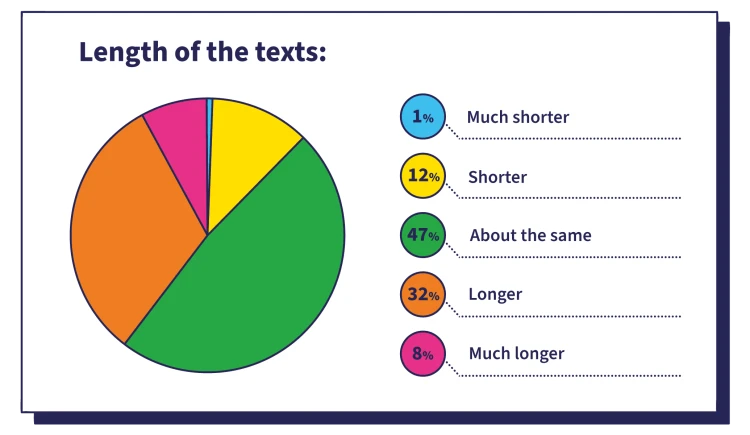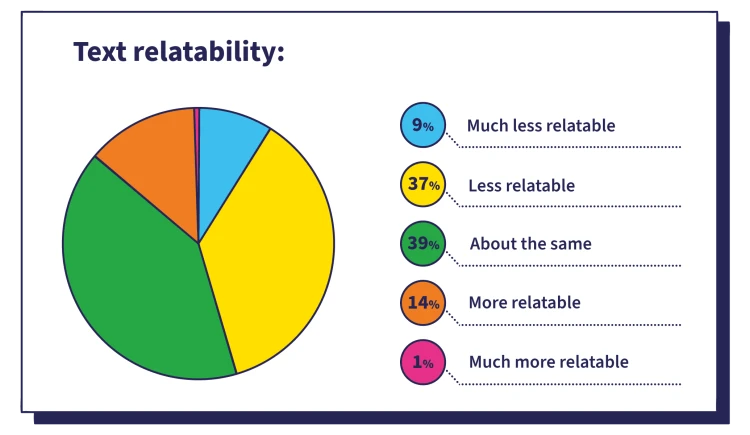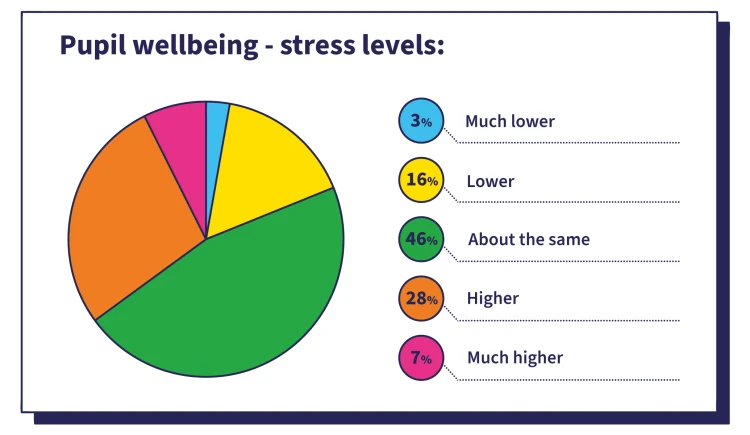Survey Snapshots: 2024 Reading SATs paper analysis
The 2023 Reading SATs paper is widely regarded by educators as the most difficult paper in recent years.
With the efficacy, fairness and necessity of SATs being a meaningful current conversation, we conducted a survey with hundreds of educators nationwide to address key concerns regarding the 2024 Reading SATs paper compared to last year’s, including:
- Vocabulary.
- Length.
- Text relatability/cultural capital.
- Pupil wellbeing.
- Overall difficulty and fairness.
We also hosted a series of free webinars dedicated to ‘Developing skills and strategies for SATs’ and ‘A deep dive into the 2024 Reading SATs paper’ with special guest Heather March, Director of Teaching and Learning at Aim High Academy Trust.
SATs vocabulary
Reading vocabulary is one of the five essential pillars of reading. Without mastering vocabulary, pupils won’t be able to become proficient readers, which will severely limit their academic and life outcomes. Alex Reynolds, Content Specialist for Literacy at the Education Endowment Foundation, highlights vocabulary importance:
“The relationship between vocabulary learning and reading comprehension is a reciprocal one. Our vocabulary knowledge supports good reading comprehension, and at the same time, good reading comprehension offers opportunities to learn new word meanings.
“But the opposite is also true because, as we might expect, children with poor reading comprehension typically have lower levels of vocab knowledge. Poor vocabulary limits access to texts, which reduces opportunities to learn new word meanings, and so on, in a vicious cycle.”
Alex Reynolds, Through the Keyhole of the House of Reading, International Reading Conference 2023
RSUK Survey Snapshot: UK educators, when asked how the 2024 Reading SATs paper compared to the 2023 paper, said:
- The vocabulary was more complex (48%).
- The texts were more complex (42%).
Feedback included:
“Language used was complex and not appropriate for all children. Lots of children struggling with all three texts.”
“The complexity of the questions was the challenge yet again. Some questions are so ludicrously worded that it is hard to get to the nub of what is actually required.”
Improve vocabulary with DreamBox Reading Plus
When using our reading intervention programme, pupils engage with and master vocabulary in the Vocabulary component and then encounter those words in their Reading (SeeReader) selections.
Reading Plus features 12 levels of vocabulary tailored for pupils. These words encompass highly valuable, cross-curricular words that aid in unlocking the meaning of complex texts. Critical, year-appropriate academic vocabulary is seamlessly integrated into every text within the programme. As pupils advance through the programme, they encounter a gradual increase in both vocabulary complexity and sentence length.
These skills are crucial in SATs, where if a pupil doesn’t recognise the vocabulary, or cannot use context clues to figure it out, they will be unable to comprehend the text and gain marks.
“The children have to know the definition without question, and they can no longer be vague about it. If the child cannot nail the answer, then they don’t get the mark. The vocabulary side of the Reading Plus programme has helped enormously with this element. Reading Plus adds depth to reading understanding, widens children’s knowledge of the world around them, and builds strong vocabulary.”
SATs text length
In our survey, 47% of educators thought this year’s paper was about the same length as last year, while 12% thought it was shorter (this group was correct).
2024’s Reading paper was 100 words shorter than 2023’s. However, a substantial 32% still thought it was longer. This is potentially due to the 2023 paper being controversially long. Therefore, despite being shorter, the 2024 paper was longer than many previous years.
Pupils need sufficient stamina and fluency to complete the Reading SATs paper confidently. The required rate for the paper is 185 words per minute.
Compared to 2023, UK educators said:
- The texts were about the same length or shorter (60%).
- The texts were longer (32%).
Feedback included:
“The texts are too long for most children to finish in time.”
“With the length of texts and complexity of the questions, 60 minutes is not enough time for a decent reader.”
“Better texts, but far too much for an hour.”

Improve stamina and fluency with Reading Plus
Pupils who need to develop their reading stamina typically see text presented using the patented Reading Plus Guided Window.
The Guided Window scaffolds the reading experience by guiding the reader’s eyes left-to-right across a page, utilising a moving box, the speed of which is specific to each pupil. This scaffold changes how pupils approach the text, while gradually and effectively increasing the rate at which they can read it with good comprehension and stamina.
With this practice, pupils overcome inefficient reading behaviours such as habitual re-reading and decoding words they already know. Once pupils demonstrate mastery, the scaffold is removed.
As pupils improve fluency and stamina, they can focus on comprehension and gaining knowledge rather than on the mechanics of reading.
“Since implementing Reading Plus, we have noticed a positive impact on our pupils’ fluency, stamina and confidence. Reading levels are far better and our children are growing increasingly fluent.”
Assistant Head Emma Hodgson and Year 6 Teacher Erin Smith from Colegate Community Primary
SATs text relatability
While reading can cause difficulties for all pupils, disadvantaged children often encounter similar problems based on their circumstances. One of these problems is a lack of cultural capital, which limits their access to certain text topics. This can be particularly damaging in SAT papers, where pupils are exposed to three unseen texts that could contain completely unrelatable content, so they struggle with comprehension.
SATs have been challenged for being too exclusive, and TES reported that “children lacking social capital are doubly disadvantaged” as far back as 2016.
Our RSUK survey results revealed:
- 39% said the texts had the same relatability as last year.
- 46% said the texts were less relatable or much less relatable.
Feedback included:
“In terms of cultural capital, our children won’t have experienced some of the concepts.”
“It bore no interest to my children and the paper did not show fairness in capital cultural experiences.”
“The papers are more and more aimed at middle-class, white children.”

Improve cultural capital with Reading Plus
A diverse content library of high-interest and age-appropriate texts benefits all children. Reading Plus’s content is strategically written and chosen to encourage new ways of thinking and foster discussions.
The programme offers texts that are “mirrors” and “windows” – an approach advocated by scholar Rudine Sims Bishop, widely regarded as the mother of multicultural literature. Through reading texts in Reading Plus, pupils can see themselves and their lives reflected in their selections, and gain an understanding and appreciation of experiences different from their own.
Reading Plus tracks pupils’ reading behaviours and will recommend more diverse texts to broaden pupils’ cultural horizons.
Not only does it help them learn, develop and grow as people, but by providing children with a breadth of knowledge, it increases their chances of accessing the more obscure content in Reading SATs papers by improving their cultural capital.
“Our pupils have a very low cultural capital. When Ofsted came to visit, they liked Reading Plus because the texts broadened pupils’ understanding. They offer viewpoints of different places in the world, varying topic matters and traditional stories.”
SATs pupil wellbeing
Pupil wellbeing has been a huge conversation regarding SATs for years – with understandable cause for concern according to recent insights:
- 63% of parents of 7- to 14-year-olds felt children were under too much pressure.
- A third of primary school leaders are more concerned about the mental wellbeing of their Year 6 pupils this year compared with their previous cohorts.
- Increased pressure on teachers over outcomes could also filter through to some pupils.
RSUK survey results revealed:
- 46% said the stress levels of their pupils compared to last year were about the same.
- 35% said they were higher or much higher.
Feedback included:
“The last text made my most confident student cry. She aced her 11+ and was ‘broken’ by her SATs today. She has never not understood the texts. Today, she was a shell.”
“Far, far too wordy and not child friendly at all. I had children in tears afterwards as they could not finish.”

Improve pupil wellbeing with Reading Plus
Reading Plus accelerates pupils’ reading progress to the level required to confidently complete the Reading SATs paper.
Reading Plus’s adaptive technology places each pupil on a personalised reading journey to address their individual needs, maximise their progress and effectively prepare them with essential skills for the SATs. Furthermore, with up-to-date comprehensive data reports readily accessible through the programme, teachers can easily see which pupils will likely finish and pass the SATs paper, and which pupils need additional support.
“Our current Year 6s are better prepared for SATs since using Reading Plus. It specifically supports their reading speed and comprehension skills, which are fundamental for completing and passing the Reading SATs.”
Lyndsey Curbishley, Curriculum Lead at Whitefield Primary School
SATs overall difficulty and fairness
RSUK survey results revealed:
- 45% said the paper was about the same fairness in assessing pupils’ abilities as last year.
- 38% said it was less or much less fair.
- 33% said the paper was harder or much harder.
- 48% said it was about the same – however, it is worth noting that last year’s Reading paper is believed to be the hardest since 2016 (which was corroborated in Ofqual’s national assessments regulation annual report for 2023).
Feedback included:
“The overall test difficulty was about the same as last year, but last year’s test was awful too.”
“2023 and 2024’s paper was harder than many previous papers.”
“The test felt fair overall, but there did not feel much variation in the complexity of the texts. The first felt close in challenge to the last.”
Improve comprehension with Reading Plus
Reading Plus supports educators’ SAT reading strategies as the programme provides comprehensive question-level analysis reports.
After reading a text selection from the programme’s vast online library, pupils practise their understanding by answering ten comprehension questions.
All of the skills and sub-skills taught and tested in Reading Plus’s SATs-style reading questions support the KS2 reading content domains.
“We wanted something that would improve their fluency as often they do not reach the final text in the Reading SATs tests. In 2019, our reading results for Year 6 were 63% EXS and 13% GDS. After using the programme, our recent SATs results increased to 86% EXS and 41% GDS.”
Verity Lee, Year 6 Teacher and Assistant Head at Sunnyside Spencer Academy
Discover how Reading Plus will improve your pupils’ fluency, vocabulary and comprehension with a free four-week pilot.
Call:
0191 389 6078 (option 1)





